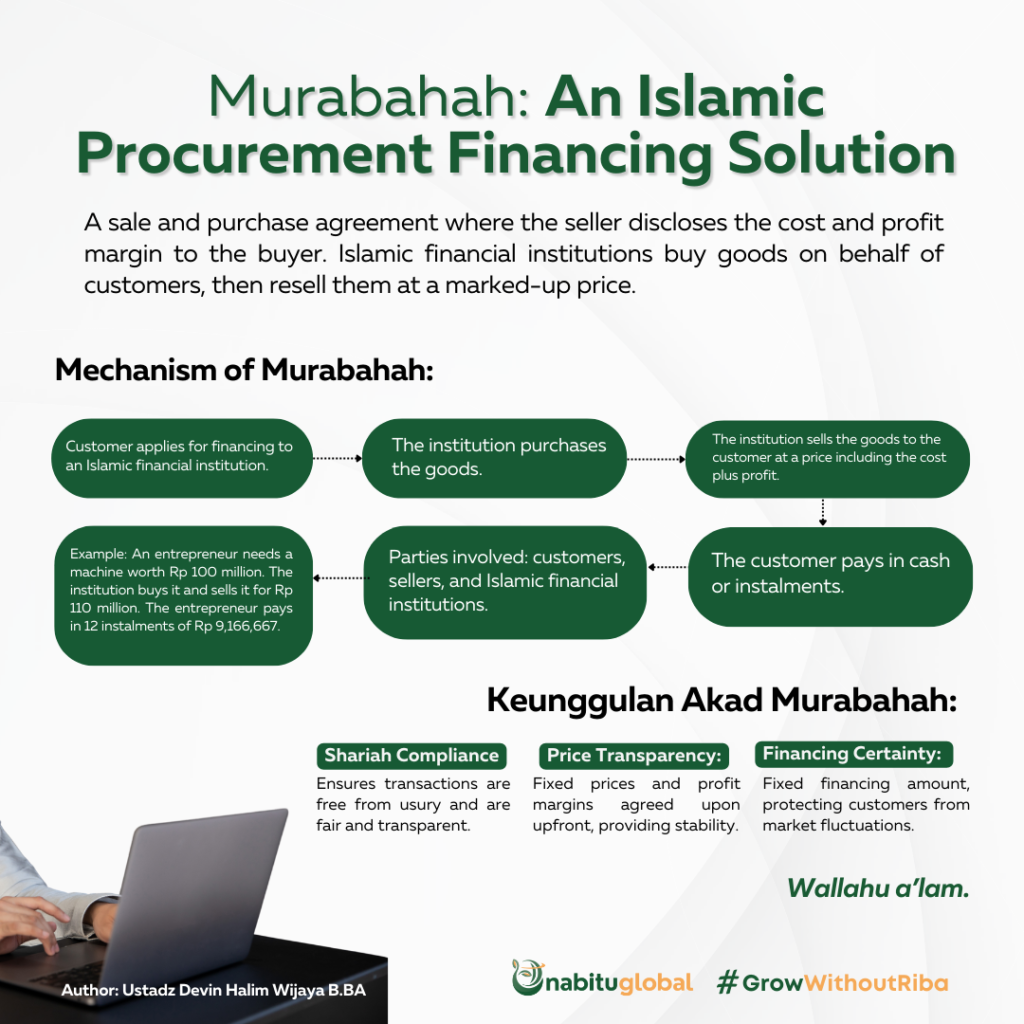Murabaha an Islamic Procurement Financing Solution
In the business world, the need for financing for the procurement of goods and services is very important. A financial system that complies with sharia principles is an urgent need, especially for Muslim communities that want to ensure their financial activities are free from riba (interest) and gharar (uncertainty).
One of the popular forms of financing in the Islamic financial system is the murabaha contract. This article aims to explain why Shariah-compliant financing solutions, such as murabaha contracts, are so important. By understanding the mechanics and advantages of murabaha contracts, businesses can take advantage of halal and profitable financing.
Definition of Murabahah Contract
Murabahah is a sale and purchase contract in which the seller discloses the cost of the goods and the agreed profit margin to the buyer. In the context of financing, Islamic financial institutions buy goods on behalf of customers, then resell them to customers at a price that includes the cost of acquisition plus an agreed profit margin.
The murabahah agreement is based on Quran verses and hadiths. For example, in the Quran it is mentioned:
ذَٰلِكَ بِأَنَّهُمْ قَالُوا إِنَّمَا الْبَيْعُ مِثْلُ الرِّبَا
‘And Allah has legalised buying and selling and forbidden (riba) usury…’ (QS. Al-Baqarah: 275).
The hadith of the Prophet Muhammad (peace and blessings be upon him) also states:
أَبَا سَعِيدٍ الْخُدْرِيَّ يَقُولُ: قَالَ رَسُولُ اللَّهِ صَلَّى اللَّهُ عَلَيْهِ وَسَلَّمَ: إِنَّـمَا الْبَيْعُ عَنْ تَرَاضٍ
Abu Sa’id Al Khudri reported: Rosululloh said: ‘Indeed, buying and selling is based on mutual consent.’ (Ibn Majah).
In conventional financing, the interest charged on a loan can change and is often not transparent. In contrast, in a murabaha contract, the price and profit margin are set at the beginning and fixed until the end of the financing period, thus providing certainty for all parties involved.
Murabahah Agreement Mechanism
Process and Stages: The stages in the implementation of a murabaha contract in Islamic financial institutions include:
- The customer submits a financing application to an Islamic financial institution.
- The financial institution purchases the goods that the customer wants.
- The financial institution sells the goods to the customer at a price that includes the cost of acquisition plus a profit margin.
- The customer pays the price in cash or in installments as agreed.
The parties involved in this murabaha contract scheme are the buyer (customer), the seller (supplier of goods), and the Islamic financial institution.
An example in this case is: ‘a businessman needs a production machine worth Rp 100 million. The Islamic financial institution buys the machine and sells it to the entrepreneur for Rp 110 million, which includes a profit margin of Rp 10 million. The entrepreneur agrees to pay in 12 monthly instalments of Rp 9,166,667.’
The advantages of the murabaha contract can be summarised in the following points:
Shariah Compliance: Murabaha contracts ensure compliance with sharia principles, avoid usury, and guarantee that transactions are conducted with transparency and fairness. This is because the murabaha contract is built on a sale and purchase contract that brings fairness from the exchange of 2 assets based on the agreement of both parties to the transaction.
Price Transparency: One of the main advantages of the murabaha contract is price transparency. The base price and profit margin are agreed upon upfront, so there are no price changes during the financing period.
Financing Certainty: The murabaha contract provides certainty of the amount of financing provided, so customers do not have to worry about cost fluctuations or changes in market conditions that may affect payments. This is because the principal price and margin are already clear when the murabahah contract is made at the beginning so that the potential for price fluctuations is covered at that time. This distinguishes murabaha from usury loans that have the potential to increase interest if the customer cannot pay all instalments on time, where the remaining instalments that are not paid off become new principal debt that adds interest.

Murabaha is a transparent, fair and Islamic financing solution that complies with Islamic principles. The advantages of the murabaha contract include sharia compliance, price transparency, and financing certainty. The murabahah agreement is very important as a halal and reliable financing alternative, especially in a Muslim-majority country like Indonesia. May Allah ﷻ always help us obtain financing with halal and sharia-compliant schemes.
Wallahu a’lam
References
- Al-Quran. Surah Al-Baqarah, Ayat 275.
- Abdul-Rahman, Y. (2010). The Art of Islamic Banking and Finance: Tools and Techniques for Community-Based Banking. John Wiley & Sons.
- Usmani, M. T. (2002). An Introduction to Islamic Finance. Kluwer Law International.
- Antonio, M. S. (2001). Bank Syariah: Dari Teori ke Praktik. Gema Insani Press.
- Jual Beli Berdasarkan Suka Sama Suka. (n.d.). Ibnumajjah.com. Retrieved May 18, 2024, from https://ibnumajjah.com/2016/04/20/jual-beli-berdasarkan-suka-sama-suka/







